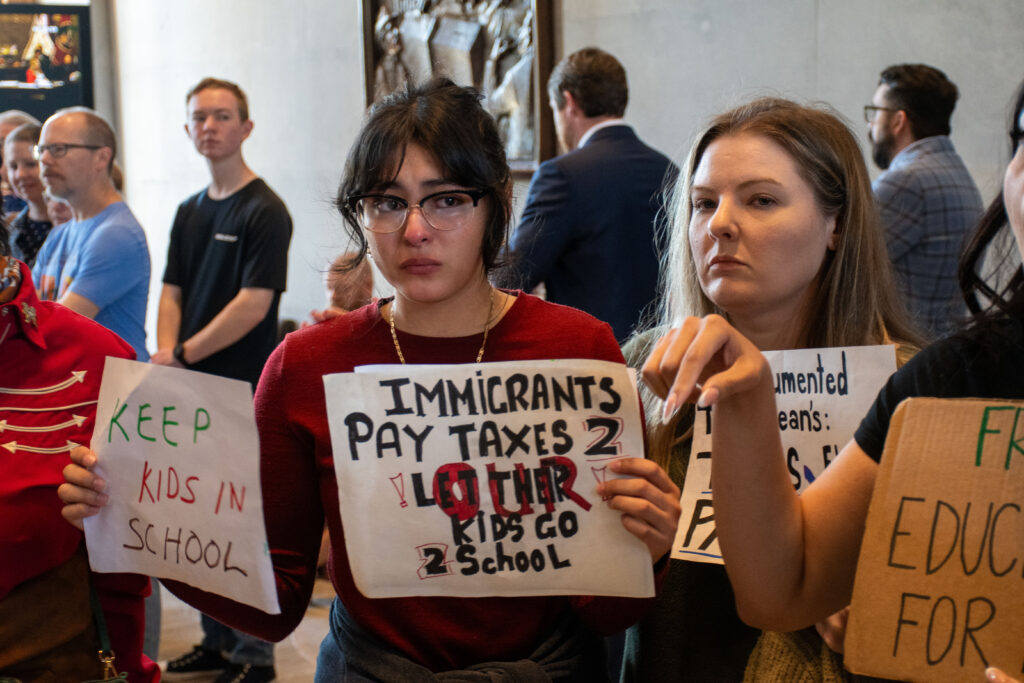
A measure to challenge the right to an education for undocumented students narrowly passed the Tennessee Senate, 19-13, to the outrage of protesters inside and outside of the chamber.
If passed by the House, the bill would allow schools to refuse undocumented students or charge their families tuition.
Sen. Bo Watson, R-Hixon, said that he proposed the bill as the answer to a financial issue. On the Senate floor, he argued that the cost of educating students without legal status is too high. His bill challenges Plyler v. Doe, the U.S. Supreme Court case that established all students have a right to an education, regardless of immigration status.
“Since the Plyler decision deprived the state of having this legislative debate, we have been mandated or forced to pay that additional cost without consideration,” Watson said. “(Plyler) was the voice of the court being imposed on the people. This, my friends, this is the voice of the people being exercised through their elected representatives.”
The state would still have to keep schools funded at their current level under the school voucher program that passed earlier this year. Watson has argued that while the state would continue to pay the same for education, rejecting or accepting tuition for undocumented students in addition to that would increase per-student funding.
Several Republicans spoke against the bill, including Sen. Ferrell Haile, R-Gallatin, who referenced the Biblical prophet, Ezekiel.
“The child will not share the guilt of the parent, nor the parent share the guilt of a child,” Haile said, quoting Ezekiel 18:20. “I believe that we are punishing children for the wrongdoing of their parents. I don’t think that’s the proper way to do (this). We need to address the issue itself rather than using children as a pawn.”
Democrats raised the question of what happens to children who have faced abuse or no longer have access to their birth certificate. Watson said that would be up to the school districts, which have a choice on whether to accept students who don’t have documentation.
“The bill does not prohibit private school, home schooling, individuals from providing tuition, it doesn’t prohibit any of that,” Watson said. “If a district were to adopt this as their policy, then it is likely that there would be organizations, perhaps nonprofit organizations, that may consider this part of their mission.”
Charlane Oliver, D-Nashville, argued that the bill would exhaust nonprofits and exacerbate crime.
“As a born-again Christian, I want to make that very clear, Matthew 25 said that: ‘Whatever you did for one of the least of these brothers and sisters of mine, you did for me.’ If we truly believe that, then we must have that same compassion for undocumented children … Let’s not pick and choose which children are worthy of our protection.”
The bill ultimately passed, with cries of outrage from the gallery. Senate Speaker Randy McNally had state troopers remove them from the chamber.
After the vote, protesters turned their focus to the next vote. The bill still has to clear a House committee on Monday before it can go before the full floor. Gisselle Huerta, founder of the immigrant advocacy group Hijos de Inmigrantes, appealed to children of immigrants, asking them to show up to the capital on Monday.
“I know a lot of immigrants are scared to come out of here, but do it scared. Do it like your parents did and fight for our rights,” Huerta said. “Whether they like it or not, we are here to stay!”
Luis Pedraza, who came to protest the bill, told WPLN News that if it passes, he’s worried about Latinos in rural areas, like his hometown of Shelbyville.
“The point is cruelty. The point is overburdening the system. The point is making it harder for immigrant communities in all parts of the state,” Pedraza said. “I’m worried about a place like Shelbyville, where 25% of students — if not more than 25% of students — are Latino. We don’t know what their status is, but we know this is going to affect a lot of families.”

